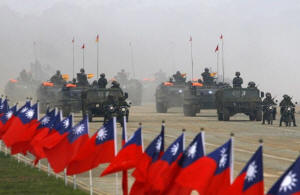|
China considers democratic Taiwan to be a wayward province and
has never renounced the use of force to bring the island under
its control.
The United States has no formal ties with Taiwan but is bound by
law to help it defend itself and is the island's main source of
arms.
The National Defense Authorization Act (NDAA), passed by the
House on Friday, also proposes expanding training and exercises
with Taiwan.
Chinese foreign ministry spokesman Lu Kang said "negative
content" related to Taiwan went seriously against the "one
China" principle and was an interference in China's internal
affairs.
"China has already lodged stern representations with the United
States about this," Lu told a daily news briefing.
China resolutely opposes any form of official contacts between
the U.S. and Taiwan militaries, he said.
"We urge the United States to fully recognize the serious
harmfulness of the relevant clauses in the act, and should not
allow then into law, and not turn back the wheel of history to
avoid damaging the broad picture of Sino-U.S. cooperation."
China regularly calls Taiwan the most sensitive and important
issue between it and the United States.
China urged the United States last month to revoke immediately
its "wrong decision" to sell Taiwan $1.42 billion worth of arms,
saying it contradicted a "consensus" President Xi Jinping
reached with his counterpart, Donald Trump, in talks in April in
Florida.
Beijing's relationship with Taiwan has been frosty since
President Tsai Ing-wen won election on the island by a landslide
last year.
China suspects that Tsai, who leads the independence-leaning
Democratic Progressive Party, wants to declare the island's
formal independence, a red line for Beijing.
Tsai says she wants to maintain peace with China.
(Reporting by Ben Blanchard; Editing by Robert Birsel)
[© 2017 Thomson Reuters. All rights
reserved.] Copyright 2017 Reuters. All rights reserved. This material may not be published,
broadcast, rewritten or redistributed.
 |
|






